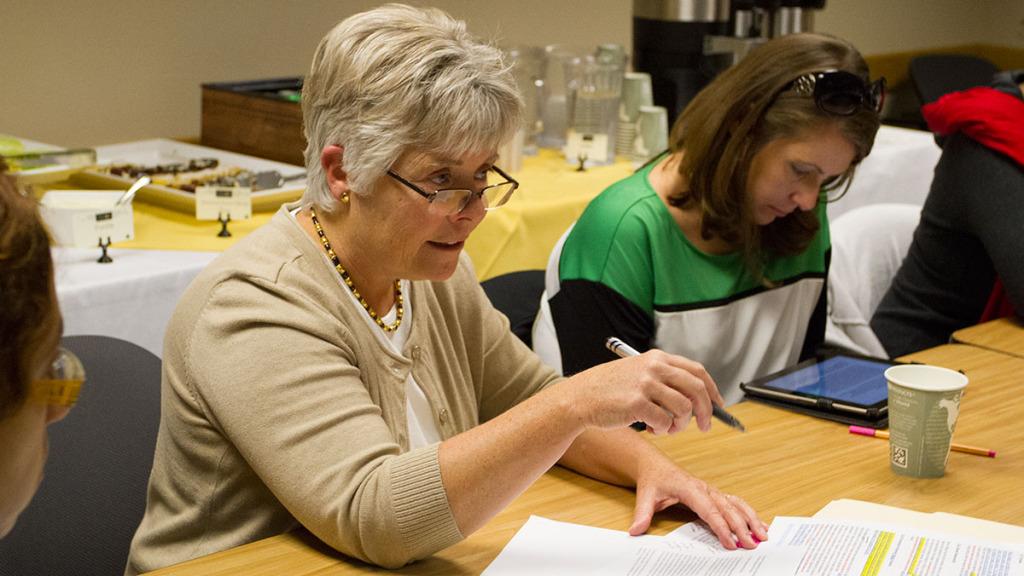Ithaca College’s top administrators attended the Faculty Council’s Nov. 11 meeting in the Ithaca Falls Room to discuss motions on employee benefits, honorary degree nominations and the next step in publicizing the college’s research on shared governance.
Among those present were President Tom Rochon; Nancy Pringle, vice president and general counsel of legal affairs; and Mark Coldren, associate vice president for human resources.
The council passed a motion to accept the findings from the report from the Shared Governance Research Task Force, which was created in 2013 to explore the possibilities for shared governance at the college. Peter Rothbart, faculty council chair, said the report is an important starting point for a campus-wide discussion. The council discussed what to do with the document and whether to make it public.
Vivian Bruce Conger, associate professor of history, said she thought there had been too much work put into this project not to make it public.
“It needs to go up to faculty,” Conger said. “We need to start talking about this issue in some way. We spent a year doing the work.”
After some discussion, the council passed a motion to put the document on Sakai, to send out emails to all of the faculty and to host several town hall meetings to gather feedback and move forward from that point.
Coldren then spoke to address concerns about employee benefits. The council concluded it would consider reopening a benefits committee to assist with the decision-making process in the future. Members of the council expressed concerns about the options available. Coldren said the current options are the best they could find and the council compares rates among institutions every year.
Pringle was present at the meeting to obtain feedback about recent policy changes and adjustments with regard to the Ethics and Integrity Policy; the policy on nepotism, specifically the employment of friends and family members; and the Conflict of Interest Policy.
Pringle said changes were made in order to bring the policies into compliance with state law changes. Specifically, volunteers now have to be covered under the Ethics and Integrity Policy, and reports to the Audit Committee for the Board of Trustees must now happen three times a year as opposed to once a year.
Several members had concerns about wording in the policy changes, but overall the council passed a motion voicing its approval of and agreement with the Ethics and Integrity Policy.
Members also discussed the nepotism policy, clarifying that it was meant to work in conjunction with the Conflict of Interest form. Pringle said it was not meant to discourage hiring of faculty members in relationships but rather was concerned with cases where there would be a power imbalance between involved persons.
Pringle said the Conflict of Interest form was an effort to promote discussion, not to be constricting.
“The disclosure is just to open up a conversation on what to be mindful of,” she said.
Finally, President Rochon met with the council to discuss how to approach the selection process for honorary degrees. An honorary degree is one granted to an esteemed person of interest by an institution in recognition of his or her achievements. Rochon said he wanted those involved in the decision-making process to have a general meeting to identify what they are looking for in a candidate.
“It’s important that we have a shared philosophy,” Rochon said.
Members discussed whether or not a direct connection to the college was crucial for potential candidates. Rochon said in the past, many of the degrees have gone to people in the music field, so there should be more diversity going forward. Rothbart said they needed nominations from diverse fields. Cynthia Henderson, associate professor in theater arts, said she saw the recipient as someone who made a difference when the group was asked to define the word “outstanding” as it was used in the criteria.
“To me, outstanding means someone who is a game changer,” Henderson said. “They have made a change in that field.”
Rothbart said the council will receive nominations from the entire campus community between December and January. Three entities are involved in the decision-making process: the nominations committee, the Faculty Council and Rochon.








